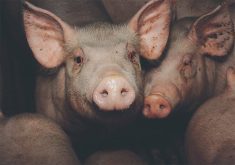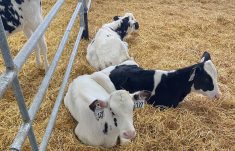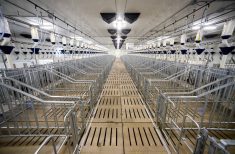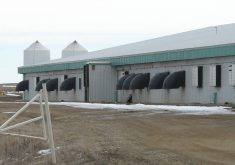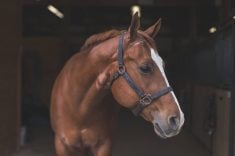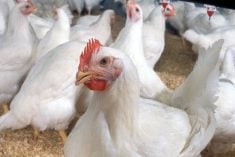Public opinion surveys have shown Manitobans have a lower opinion of agriculture than non-farmers in other provinces, the executive director of the Ontario Farm Animal Council says.
“Out of the whole country, Manitoba has the least positive image in agriculture,” Crystal MacKay told her audience at Manitoba Ag Days.
In a later interview, MacKay refused to disclose the actual rankings out of an Ipsos Reid survey done in Nov. 2010, saying Manitoba was only a “little bit” behind other provinces but enough that farmers here need to take note.
Read Also
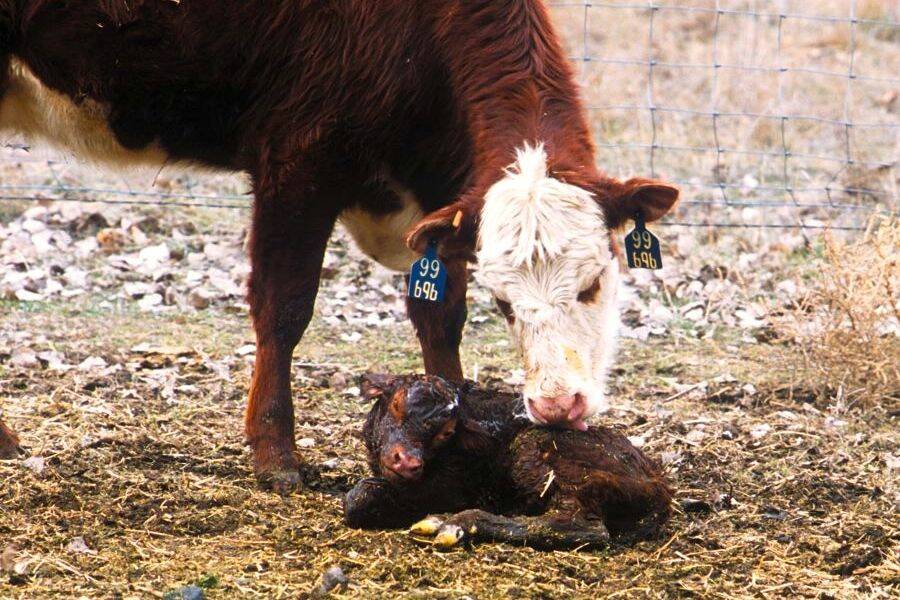
Scours doesn’t hibernate: Infectious risks for cold weather calves
Identifying specific pathogens and management flaws is essential for effective calf scours treatment and prevention on your farm.
“We haven’t released the full provincial data publicly,” she said. “My message to the industry in the crowd was to be aware that we need to continually invest in goodwill in agriculture, that it currently is at a healthy level, but can slip downwards and erode quite easily.”
Nationally, the survey found that 57 per cent of Canadians have a positive impression of agriculture in this country, which is up from 41 per cent four years ago.
POSITIVE PERCEPTIONS
In Ontario, that positive perception jumped from 56 per cent in 2006 to 66 per cent in 2010. Only nine per cent of the people in Ontario report a negative image of Canadian farming, which is down 12 per cent from 2006 when 21 per cent of Ontarians had a negative perception of farming.
MacKay also gave numbers from a 2009 survey which found that 94 per cent of Canadians say they know little or nothing about farming.
She said this is important, because this means that the population is very vulnerable to negative information about agriculture, whether it is true or not.
Brenda Bazylewski, director of communications for Manitoba Egg Producers, said she was surprised by the suggestion that Manitoba’s agricultural image is lagging behind other provinces. Bazylewski said Manitoba Egg Producers commissions its own studies from a third-party source as well.
In June 2010, Prairie Research &Associates Inc. conducted a quantitative study on behalf of Manitoba Egg Producers, in which they asked 485 adult Winnipeggers a variety of questions related to the egg industry.
Respondents of the survey were asked if they strongly agree, agree, disagree or strongly disagree with the statement: “I trust Manitoba egg farmers to take good care of their hens.”
Fifty-five per cent strongly agreed, 35 per cent agree, seven per cent disagree and three per cent strongly disagree. This is an increase in a positive response from the study in 2003 where only 26 per cent of those surveyed strongly agreed with the statement.
RESPECT
In September 2010, Prairie Research &Associates Inc. held a focus group, two hours each session with two groups of 10 women, where the participants discussed a variety of topics related to egg farming such as animal care and characteristics of an egg farmer. The same conclusions were found from the previous study; that the majority of participants had respect for egg farmers and trust the work they do.
Bazylewski said that egg farmers in this province have earned consumers’ trust by ensuring they meet the needs of the general public by demonstrating they are conscientious caregivers of their hens and producers of quality food.
The Internet has been influential in shaping non-farmers’ perceptions of farming, MacKay said. The infamous online videos of farmers abusing animals have a major impact on people’s perception of the reality of farming. She says that it is every farmer’s responsibility to make sure the public is receiving a positive image; “Don’t have anything in your farm operation that you wouldn’t want to see on YouTube tonight.”
TWO TYPES OF ACTIVISTS
MacKay describes two types of activists; an animal rights activist versus those concerned with animal welfare. Animal rights activists believe that no one has the right to use animals and that animals should be entitled to the same rights as humans.
Animal welfare activists believe that while animals can be used for human purposes they should live and be killed in a humane way. Animal welfare activists are against farm practices such as gestation crates and not providing pain relief for invasive procedures such as debeaking and musleing (removing strips of wool-bearing skin from the buttocks of lambs to prevent flies from laying their eggs there.)
It is important to know who you are dealing with, says MacKay. Animal rights activists are totally against farming and all practices to do with it. Animal welfare activists understand that animal production has a place in society, but should use humane practices. Animal welfare activists are willing to work with farmers, instead of against them.
OUTSIDE INTEREST
Increasingly, organizations that were once associated with pet welfare are turning their attention to farm practices. For example, the Winnipeg Humane Society’s website states: “The Winnipeg Humane Society is working to eliminate practices which cause farm animals distress and suffering through educating the consumer, lobbying government, and consulting with farm groups.”
For the last five years the WHS was involved in a very publicized campaign to end sow stalls, saying the use of the stalls is cruel and unusual. Last November, WHS executive director Bill McDonald presented Manitoba’s deputy minister of agriculture with a petition with more than 10,000 signatures that calls to put an end to sow stall use in the province.
MacKay said that it is up to all producers to get truthful information about their work out to the public, so misinformation is not negatively affecting the public’s perception of the animal production industry.
———
“Don’thaveanythinginyouroperationyou wouldn’twanttoseeonYouTubetonight.”
– crystal mackay




